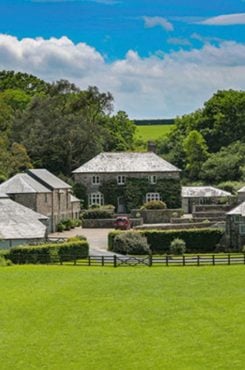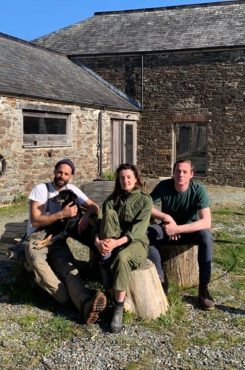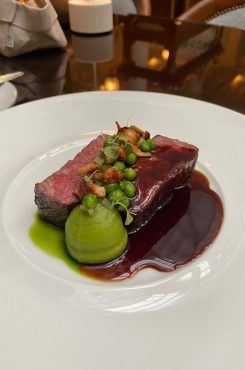CODE visits Cornwall’s Melilot Farm, home to the future of farming
Published 12 September 2021
by Chloe Hamilton
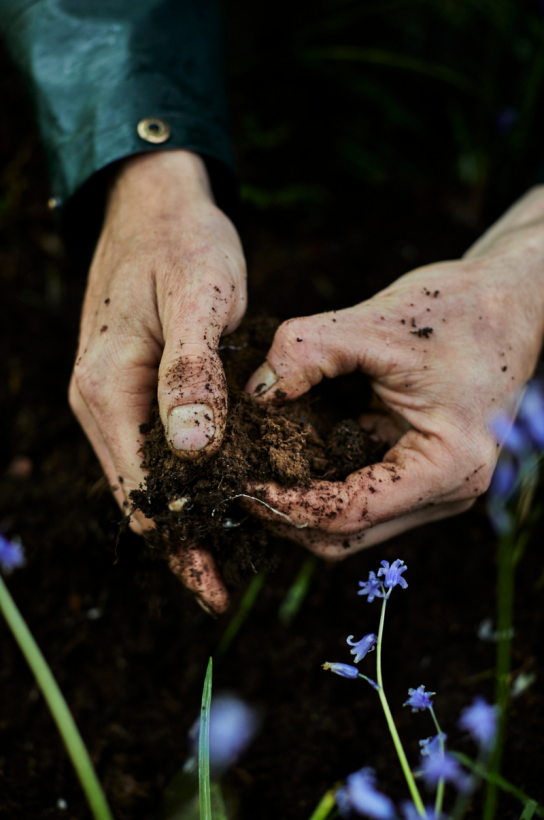
On a 120-acre farm in south east Cornwall, there’s something special brewing. It’s not just the compost tea or the house-made beer. It’s the makings of a revolution in how we understand our produce, our land, and our entire food system.
Melilot at Crocadon Farm is set in the gently rolling hills of the Tamar Valley. It was once a dairy farm, then a sawmill, but it has since been unleashed from its intensively farmed past to become a regenerative utopia. It’s all thanks to a man named Dan Cox. He is many things – a chef, farmer, brewer, builder, ceramicist – but above all he is endlessly generous in sharing his knowledge and his journey to build a better food future.
Cox has been in Cornwall since 2017, steadily (and much of the time single-handedly) building a restaurant space and regenerating the land to supply it. Even in its partially finished state, it’s beautiful. The oak, steel and concrete dining room leads through to a hand-built brewery and fermentation room. In the adjoining light-filled stone barn, where the team cook and eat, there are stacks of meticulous ceramics.
Like anything, the impact of this work hinged on being financially sustainable. In October 2020, four years of Dan’s own investment was shored up by the arrival of Natoora – one of the UK restaurant industry’s most lauded and widely used suppliers of fresh fruit and veg. Now in partnership with Natoora, Cox is able to deliver his produce at scale.
“We’re trying to find a financially sustainable way to farm,” explains Franco Fubini, Natoora’s CEO. “It’s very hard to prove regenerative agriculture is a sustainable farming method otherwise.”
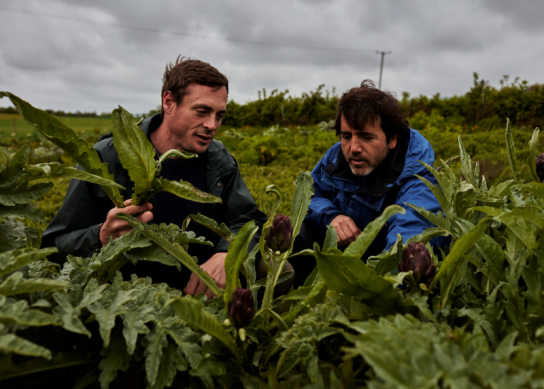
This summer, Cox and his small team have been growing around 75 different crops, including trials. The goal is to whittle the selection down to between 20-40 varieties that best suit his terroir.
“The Natoora model hinges on scale,” says Fubini. “We need to find the commercial crops and understand the mix and balance that works here.”
One way to keep labour costs down is to grow perennials. “They’re my favourite thing,” says Cox. “You don’t need to put the effort into cultivating. It’s more self-sustaining.”
We move around the farm, pelted by the Cornish rain. What looks wild to the untrained eye is planned. The fields of wildflowers, clovers and vetch are studded with super sweet gem lettuces, asparagus spears and opera artichokes. Cox says a “delicate balance” has been struck to keep invasive varieties like couch grass, dittanda (an old English herb, similar to horseradish) and crosnes (Japanese artichoke) in check, but the diversity also serves to nourish the soil with varying depths of nitrogen-fixing roots, to relieve compaction and to attract pollinators. Though this system looks radical, these regenerative methods are far from new. It’s simply a return to the natural systems that have been at play for centuries.
For the most effective and self-sustaining regenerative system, mixed farming is crucial. The sheep here graze the land and fertilise it, returning nutrients and carbon to the soil. In turn they have access to a nutritious buffet of yarrow, buttercup, clover, dock, chicory, dandelion, as well as branches of sweet chestnut, ash and hazel when needed.
As he takes us to his 230-strong flock – a mix of ewes, wethers and some rams – Cox explains how much more flavour these animals take on with this type of rotational grazing.
“Those sheep you see nibbling at stubbly grass, there’s no flavour in that. All the good stuff is in the shoots at the tip of the plant.” As for grain-fed animals, “well you wouldn’t want to eat the fat from that,” says the farmer.
The fat from these sheep is said to be so good that the chef Jeremy Chan created a dish for Ikoyi’s menu that featured only the fat, with no tangible meat. Cox says it’s thanks to his crossing of rare, heritage breeds that helped improve the quality.
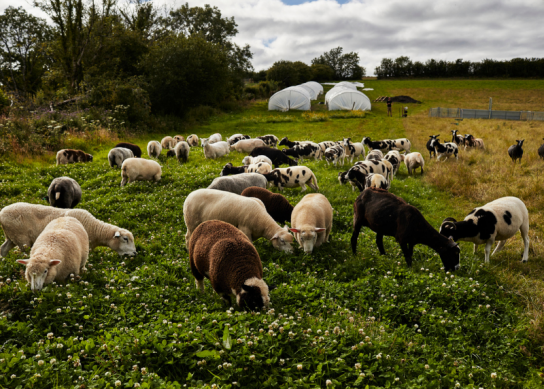
“I’ve been homing in on which sheep have good mothering abilities, great flavour and hardiness,” explains Cox. “The brown and white Jacobs are my favourite. They’re a good flavour carrier but when you cross with a Suffolk, you get better fat cover.”
The way sheep are handled here is akin to the reverence afforded to beef production. It’s a lesson in what can be achieved with higher-welfare husbandry and breeding. The more mature animals (technically mutton but they prefer the simple term ‘sheep’) have beautiful intramuscular marbling.
The healthy fat coverage means they can be dry aged for six or seven weeks, encouraging enzymatic breakdown. Basically, it means come dinner we have a tasty feast on our hands. Cox breaks down one of his sheep he’s been hanging and we eat some of it raw as a tartare, while the fat-flanked chops are cooked over coals in the yard. To me, all this is a revelation.
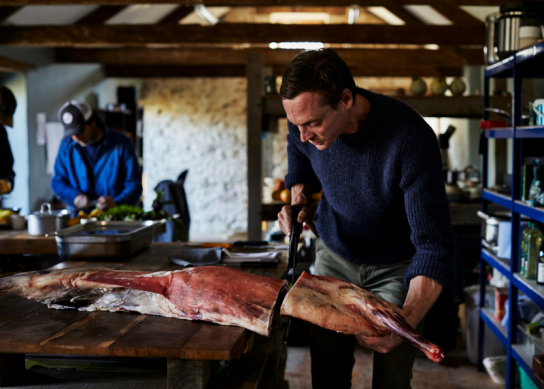
Cox can farm, but he can also cook. In 2008, he won the Roux Scholarship, and chose the three-star Can Fabes in the mountains of Catalonia for his placement. It was a far cry from things in the UK, which at the time was heavily reliant on premium products from France. Cox remembers foragers turning up at the kitchen door with mushrooms and being able to go down to the sea to buy fish straight from the arriving boats.
“The fish they used just shocked me,” he says. “It was perfect. That just didn’t happen in London then. All the fish we used was shit.”
He returned from Spain and opened Roux at Parliament Square with Michel Roux Jr. in 2010. By summer 2011, he was migrating north to L’Enclume, where Simon Rogan’s ethos had moved on from the El Bulli gastronomy of the early noughties to a more produce-focused, pared-back approach – a shift which ultimately earned the restaurant its cult status. It was here that Cox began growing at scale. His farming knowledge was modest at first but that meant freedom to question accepted wisdom. He and his team grew broad beans in winter for the leaves rather than the fruit. “We had this turbot dish,” he remembers, “with verjus and the broad bean leaves on top. They were incredible. It was all about the flavour.”
Three years of Fera followed, and with it, the relentless task of sourcing enough quality produce to feed the sizable dining room at Claridge’s. It led Cox to Cornish suppliers like Philip Warren and Good Earth Growers (now his neighbours) and, ultimately, his own relocation. But his move was not to catch a break from the heat of the kitchen. “There’s a misconception that I’ve given up on being a chef and gone into farming because it’s easy,” says Cox, wryly. “God no. This is so much harder than cooking.
“The biggest problem is people don’t realise the food system is broken. We need to make it possible for people to have access to high quality ingredients without toxicity. And a lot of people don’t understand that.”
At dinner, I talk to Fubini about what brought Natoora to Cornwall. “It’s the desire to understand what it is that we sell, at a very deep level,” he says. “To deliver a high-quality product means that we need to deliver it with high-quality knowledge. We want to know more and to be able to tell the consumer more.”
At Melilot, Natoora has now launched its Earthworks programme, which aims to build a scalable agricultural model restoring soil fertility, drawing carbon into the ground and improving the nutritional density of food.
It’s a proposal to significantly transform the food system and plans are afoot to find the next farms that will mirror the philosophy at Melilot. Fubini laments the purchase of a Californian citrus farm that recently fell through. He is now looking for land opportunities close to London.
Farming is about community and one of the most striking parts of Melilot is how much it is a product of collaboration. Around the table at dinner were a collection of volunteers and friends: Tim Williams and Claire Hannington-Williams who have helped with pasture management and soil fertility; Milo Corcoran the head grower at Coombeshead; Oli Baker from Mora Farm. It is just a small part of the support network driven by a shared passion – and urgency – to correct the wrong turns of our recent agricultural past.
As we head off to leave Melilot to catch the train back to London, Cox, with his sheepdog Flash at his heels, remarks: “We must get away from the idea that we’re doing something new. We’re not. We’re doing things properly.”
—————————————–
Melilot is always on the lookout for volunteers. If you’re interested in getting involved with the farm, send an email to [email protected]. And follow @melilot.farm @natoora and @chefdancox for news of employment opportunities coming up.



